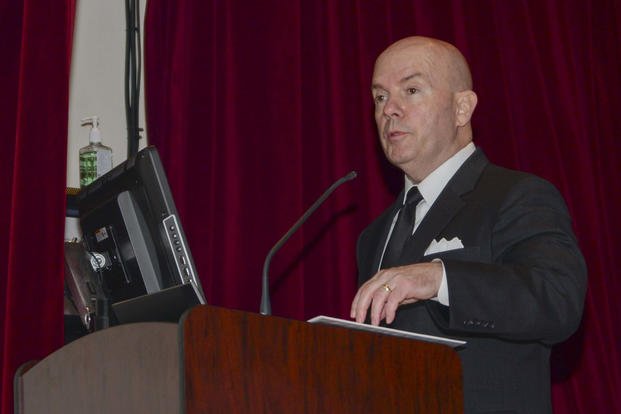Dr. Richard Thomas, a surgeon, dentist and retired Army two-star general, has submitted his resignation as president of the Uniformed Services University of the Health Sciences, according to a letter he wrote colleagues last week obtained by Military.com.
Thomas, who has led the Bethesda, Maryland-based school since 2016, had been endorsed unanimously by the school's Board of Regents for a second five-year term after his current term was to end July 31.
But as he had yet to hear from Defense Secretary Lloyd Austin about his contract renewal and to "ensure a smooth transition," Thomas announced June 14 that he planned to resign, effective July 19.
"I have been proud to serve as your president and if the secretary decides that is best for the enterprise I will be honored to continue in this role,” he wrote in his letter. “But a smooth transition is critical given the broad scope of USU responsibilities and the scheduled re-accreditation.”
Thomas said that the school’s senior vice president, retired Rear Adm. Dr. William Roberts, will step up as interim president.
The Defense Department did not respond to a request for comment by publication.
Read Next: Looking to Be Prepared for a War in the Atlantic, NATO Launches New Command
The end of Thomas' tenure at the 50-year-old school has been controversial: In December, then-Assistant Secretary for Health Affairs Thomas McCaffery moved to dismiss Thomas. McCaffery said that Thomas had mishandled charges that a subordinate disclosed the personal information of an adjunct faculty member found to have plagiarized several research papers in an effort to get him kicked out of multiple military medical organizations.
But advocates say the dismissal is linked to Thomas' fights against budget cuts for the university.
Politico reported that Dr. Jonathan Woodson, president of the university's board of regents who served as assistant secretary of defense for health affairs while Thomas was on active duty, wrote then-Acting Defense Secretary Christopher Miller late last year to address the issue.
"The relationship between Mr. McCaffery and Dr. Thomas has often been one of professional tension as a result of Dr. Thomas' dedication to mission and firm yet always ethical and enlightened defense of the University from those in the budget community who sought its closure," Woodson wrote in a Dec. 31 letter obtained by Politico. "The timing of the proposed actions, the significant inconsistencies in the letter and the draconian punishment proposed make me suspect other personal issues are involved."
Maryland Sens. Chris Van Hollen and Ben Cardin, both Democrats, wrote Miller on Jan. 8 about the issue, urging him to review McCaffery's decision to fire Thomas.
The action, the senators said, "raises serious questions about its basis and whether it is retaliatory in nature."
"The fact that this action is taking place despite the strenuous objections of the President of the USU Board of Regents raises serious questions about its basis and whether it is retaliatory in nature," Van Hollen and Cardin wrote. "Dr. Thomas has served USU with distinction and integrity, and the United States is fortunate to have him in a position of leadership."
Before being named president of the university, Thomas served as deputy director of the Defense Health Agency.
In 2019, the Defense Department's Cost Assessment and Program Evaluation, or CAPE, office recommended that the university be scaled back or eliminated as part of an effort to reduce the budget and size of the military health system.
CAPE proposed a $90 million reduction in school operations and maintenance between 2021 and 2025 and also a $73.3 million reduction in research -- essentially cutting all basic research. It also proposed eliminating programs such as the National Center for Disaster Medicine and Public Health, and the Center for Deployment Psychology.
The cuts were included in President Donald Trump's fiscal 2021 budget request and made it into the House version of the National Defense Authorization Act, but were not included in the final bill.
Still, those programs did see declines in their budgets. President Joe Biden's proposed fiscal 2022 Defense Department budget requests $178 million for the school, an increase of $8 million from the previous year's request, including additional funds for several programs.
-- Patricia Kime can be reached at Patricia.Kime@Monster.com. Follow her on Twitter @patriciakime.
Related: Defense Health Agency Says It Will Come Up $1.8 Billion Short on Cash Due to Pandemic












